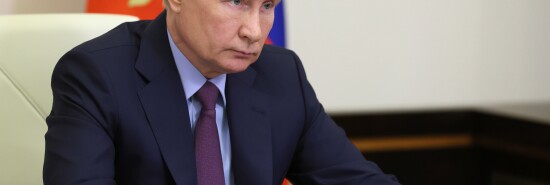
Preparing for Vladimir Putin’s war crimes trial
Michael Rubin
Russia’s war on Ukraine is now in its second year. Hundreds of thousands of Russians and Ukrainians are dead. Millions more have fled both countries. Ukraine is in ruins. It will take tens of billions of dollars to rebuild the country.
Russian President Vladimir Putin bears unique responsibility. Accountability may be improbable given Putin’s stranglehold on power, but Putin is afraid. The reason why Putin makes dissent by his one-time allies a capital offense is that he knows that the motivation for their criticism may be less sincere opposition to the Ukraine war and more an attempt to signal that they could be reasonable alternatives to Putin.
CIA’S JUDGMENT IS XI HAS ‘DOUBTS’ ABOUT SUCCESS OF POSSIBLE TAIWAN INVASION
If Putin falls but remains alive, trying him and his cronies will be no easy feat.
Consider the Nuremberg Tribunal. The victorious powers each had their own list and ideas of process and justice. They quibbled over charges. Ultimately, the eight judges acquitted three prisoners and sentenced 11 others to death by hanging. The judges sent the remainder to prison for terms ranging from ten years to life. The Americans sought to transport the condemned to Berlin for execution but other states favored keeping the prisoners in Nuremberg for security. Ultimately, it took almost two hours, beginning at 1:30 am, to carry out the executions.
A similar tribunal may rehash Nuremberg debates: Should the prisoners be executed in Moscow or transferred to Kyiv? Should they be killed in a closed location isolated from the public, in a public square, or on television for the world to see? How to balance fairness with a desire for revenge?
Rwanda offers another case in point. After the anti-Tutsi genocide, the international community took over a decade and spent $1 billion to convict only 85 participants, leaving cases against the bulk of suspects untouched. Rwandans finally had enough. They launched a grassroots process to try more than a million alleged genocidaires within three years. It was successful. Contrast this with Yugoslavian President Slobodan Milosevic, who died in prison four years into an excruciatingly slow trial.
Russians and Ukrainians must then ask whether international courts should take the lead on trials, or whether a post-Putin Russia or post-war Ukraine might be better suited to balance process and speed.
Finally, there is the case of Iraq. After Saddam Hussein used chemical weapons against Iraqi Kurds, Human Rights Watch (HRW) carefully gathered evidence. After Saddam fell in 2003, Iraqis demanded justice. HRW refused to provide evidence to the Iraqi court or investigators unless Iraq first agreed to abandon the death penalty. Many European states agreed. It was cultural imperialism at its purest as Western activists effectively held justice hostage to their own political campaign against the death penalty. Iraqis sidestepped the problem by trying and executing Saddam not for his crimes against the Kurds, but rather against Iraqi Shiites. Ukrainians should consider now whether they should allow U.S. or European investigators to operate in Ukraine absent any agreement ahead of time that all evidence belongs to and must remain in Ukraine.
Iraqis subsequently decided to bury him in his hometown, risking the transformation of his tomb into a place of pilgrimage. Ukrainians and Russians should decide now: If Putin is captured and subsequently executed, what will become of his body?
Priority No. 1 must be military victory. To defeat Putinism both now and in the future requires liberating every inch of Ukrainian territory, and perhaps even more. It is not too early, though, to plan for justice. The West’s human rights community and U.N. bureaucrats may have one idea of what justice means, but neither Ukrainians nor Russians need to default to their politically loaded expertise. They can pick from many other models, many of which may be better suited to deliver justice.
CLICK HERE TO READ MORE FROM THE WASHINGTON EXAMINER
Michael Rubin (@mrubin1971) is a contributor to the Washington Examiner’s Beltway Confidential. He is a senior fellow at the American Enterprise Institute.
